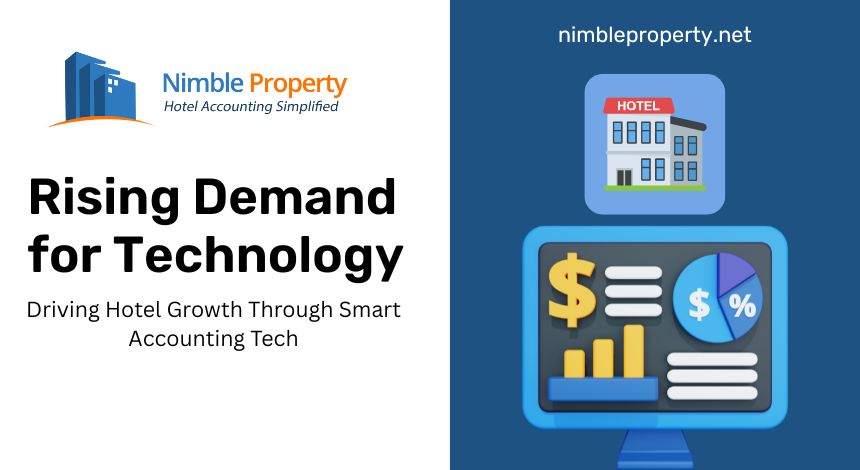Accounting and management software are at the centre of the technological revolution taking place in the U.S. hotel business. The need for cutting-edge software solutions keeps growing as hotels aim for flawless operations and improved visitor experiences. The market for hotel and hospitality management software in North America brought in an incredible USD 1.44 billion in 2024 alone. This market is expected to grow at a consistent 7.3% Compound Annual Growth Rate (CAGR) to reach USD 2.08 billion by 2030.
What’s Fueling the Growth?
This quick uptake of hotel accounting software is being driven by several important factors:
Operational Efficiency: To automate cleaning, billing, check-ins, and reservations, hotels are adopting digital solutions. In addition to reducing human work, this digital shift improves accuracy and saves money.
For instance, a mid-sized hotel chain increased visitor satisfaction by 30% by reducing staff burden and improving room turnaround time through the deployment of an AI-powered housekeeping management system.
Enhanced Guest Experience: Hotels may increase satisfaction, cultivate guest loyalty, and customize services using integrated Customer Relationship Management (CRM) solutions.
As an illustration, a posh resort that used CRM software to monitor visitor preferences—like favourite dining options and room temperatures—saw a 20% rise in repeat business.
Technological Developments: Software as a Service (SaaS) and cloud-based models are lowering the barrier to entry for complex management systems, guaranteeing scalability and flexibility for lodging establishments of all sizes.
Example: Without making significant investments in IT infrastructure, a boutique hotel that used a cloud-based PMS was able to grow from one site to five locations.
When it comes to generating revenue, Property Management Systems (PMS) are the most popular kind of hotel software. However, as more hotels realize the value of centralized and effective booking management, Central Reservation Systems (CRS) are expected to grow at the fastest rate.
Large hotel businesses are not the only ones undergoing this digital revolution. Technology is also being used by independent and boutique hotels to obtain a competitive advantage.
Although they only accounted for 3.2% of all hotel rooms, the more than 4,600 boutique hotels in the United States by 2021 generated 5.6% of all hotel room income. Important Developments in Hotel Accounting Software.
Several developments are determining the future of hotel accounting software as technology continues to transform the hospitality industry:
1. Integration of Artificial Intelligence (AI): By evaluating enormous data volumes, offering predictive insights, and streamlining revenue strategies, AI is transforming financial management.
For instance, hotel management can modify their pricing strategy in response to seasonal revenue swings predicted by AI-powered accounting software.
2. Real-Time Financial Reporting: To facilitate proactive decision-making, contemporary accounting systems offer immediate access to critical performance indicators such as Average Daily Rate (ADR) and Revenue Per Available Room (RevPAR).
For instance, a hotel chain that used real-time financial dashboards to identify billing irregularities early on cut revenue loss by 15%.
3. Smooth Integration with Other Systems: To ensure precise financial tracking and efficient operations, hotels are looking for accounting software that integrates easily with Point-of-Sale (POS) and Property Management Systems (PMS).
As an illustration, a hotel restaurant reduced errors, and the amount of time spent on manual reconciliation by 40% by integrating its point-of-sale system with the accounting system.
4. Sustainability and EcoFriendly Practices: As green initiatives gain more attention; hotel accounting software is developing to facilitate sustainable financial management and paperless operations.
Example: In line with their environmental objectives, a large hotel chain cut their use of paper by 50% by moving to digital invoicing.
5. Adoption of CloudBased Solutions: By providing remote access to financial data, cloud technology is increasing efficiency. This is especially useful when managing several properties from a single platform.
As an illustration, a hotel owner who has facilities in several states may now keep an eye on all financial transactions in real time without having to visit the locations.
6. Advanced Security and Compliance: Measures Modern accounting systems place a high priority on strong data protection and adherence to financial standards as cybersecurity worries grow.
For instance, a hotel was able to successfully thwart efforts at cyber fraud by using multi-factor authentication and encrypted financial data storage.
Conclusion:
The hotel industry’s dependence on state-of-the art software is changing how companies’ function, from improving guest happiness to simplifying financial management. For hotels hoping to prosper in a more competitive environment, accounting software is now more than simply a convenience thanks to a robust market trajectory and ongoing technological improvements.

